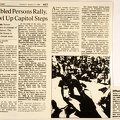June 12, 1990 - Guardian. 5
Disabled 'ecstatic' as rights act clears House
By DIANE COLEMAN
The Americans with Disabilities Act, considered by many to be the most sweeping civil rights legislation since the 1964 Civil Rights Act, easily cleared the House of Representatives May 22. It is expected to reach the president‘s desk by July 4.
The act prohibits discrimination based on disability in public accommodations, employment, transportation and telecommunications. It is intended to address "rampant, daily discrimination in every sphere of American life,“ Rep. Pat Schroeder, D-Colo., told her colleagues on the House floor.
“Mentally retarded persons are kept out of restaurants. Persons with cerebral palsy are turned away from theaters. . . . Employers cite fears of hiring disabled persons because their customers will feel uncomfortable or even repulsed,” Schroeder added. Despite strong opposition from private business and transportation lobbies, chief among them the National Federation of Independent Businesses and Greyhound Lines, Inc. , the Americans With Disabilities Act achieved bipartisan support in both houses of Congress. The House vote was 403-29.
Under pressure from the NFIB and the National Restaurant Association, the House version of the bill was amended at the last minute to allow employers to remove people with HIV infection from food handling positions. Sponsored by Rep. Jim Chapman, the amendment passed narrowly, although the Texas Democrat conceded there is no “evidence that‘AIDS can be transferred in the process of handling food.”
Tom Sheridan of AIDS Action, representing 500 community-based service organizations, predicted that the Chapman amendment would go down to defeat in the House-Senate conference committee. “It’s a horrible amendment for all people with disabilities because . . . it begins to codify the fact that irrational fear is protected by the law,” he said.
Nonetheless at press time Senate conferees had agreed to include the restrictions.
“Cheers and tears” filled the House gallery at the moment of the ADA's long-awaited passage, according to Tennessee disabled activist Michael Gibson, “but we all know that the bill is only a first step. Several agencies will be writing key regulations which offer innumerable opportunities to weaken the effect of this legislation,” Gibson said.
SOME DELAYS, FEW LOSSES
While many activists feared the House would water down the Senate version of the bill, Marilyn Golden of the Disability Rights Education and Defense Fund said that the ADA “has not been weakened anywhere near the extent that much legislation is. " According to Golden, who has worked intensively for the bill's passage over the last two years, various timetables and phase-in provisions were adopted to avoid other forms of compromise.
The ADA’s protections against employment discrimination, which parallel those applied to federally funded entities since 1973, do not go into effect for two years. Prohibitions against discrimination in public accommodations, such as theaters and restaurants, will require accessibility in facilities “construct[ed] . . . for first occupancy no later than 30 months after the date of enactment." Telephone companies will have three years to put in place a relay service for deaf people and others who depend on non-voice telecommunication.
A requirement that all new public buses be lift-equipped will take effect in only 30 days. Many attribute this to seven years of non-violent civil disobedience by the American Disabled for Accessible Public Transit. Greyhound, a private carrier, was given six years to begin replacing its retired buses with accessible ones.
Activists also waged a last-minute battle over employment discrimination remedies. Recently proposed legislation would add damages to the relief available to discrimination victims under Title VII of the Civil Rights Act of 1964. In the face of this, Golden said. the Bush administration tried “to renege on its agreement for parallelism” between the ADA and the 1964 act. It backed an amendment that would have kept remedies for disability-based discrimination at current levels if and when discrimination remedies are increased for other minority groups and women. The amendment was narrowly defeated just prior to the final vote on the bill itself.
Overall, Golden said. “We're ecstatic." The ADA “will hopefully begin to convey to the American public. left, center and right (because in some ways I don't think the consciousness of the left is any better), that disability is not a personal issue, that there’s a systematic oppression of people with disabilities. . . . Even Congress has faced the fact of the systematic discrimination. "
PHOTO (by Tom Olin): A closer view of a mass of marchers coming around a huge tree on a broad sidewalk leading up to the Capitol. Stephanie Thomas, Frank Lozano, Jennifer Keelan and others lead the march which is 12 across in some places and scattered in others. The ADAPT flag (an American Flag with the stars arranged in the wheelchair symbol instead of in rows) flies over the crowd from a few rows back. Some people are in suits and ties, some in T-shirts. Some are in wheelchairs, some carry cameras; children to older folks are in the mix.
Caption reads: Seven years of nonviolent civil disobedience by the American Disabled for Accessible Public Transit has been credited for the requirement that all new buses be lift-equipped. Above, ADAPT march on U.S. Capitol.
- Created on
- Friday 12 July 2013
- Posted on
- Friday 3 July 2015
- Tags
- ADA, ADAPT, ADAPT flag, buses, cerebral palsy, civil disobedience, Diane Coleman, disability, discrimination, DREDF - Disability Rights Education and Defense Fund, Frank Lozano, Greyhound, HIV, Jennifer Keelan, Kailee, march, Marilyn Golden, mental retardation, National Restaurant Assn., NFIB, Rep. Pat Schroeder, Stephanie Thomas, Tom Olin, wheelchair lifts
- Albums
- Visits
- 6302
- Rating score
- 4.87 (2 rates)
- Rate this photo


0 comments